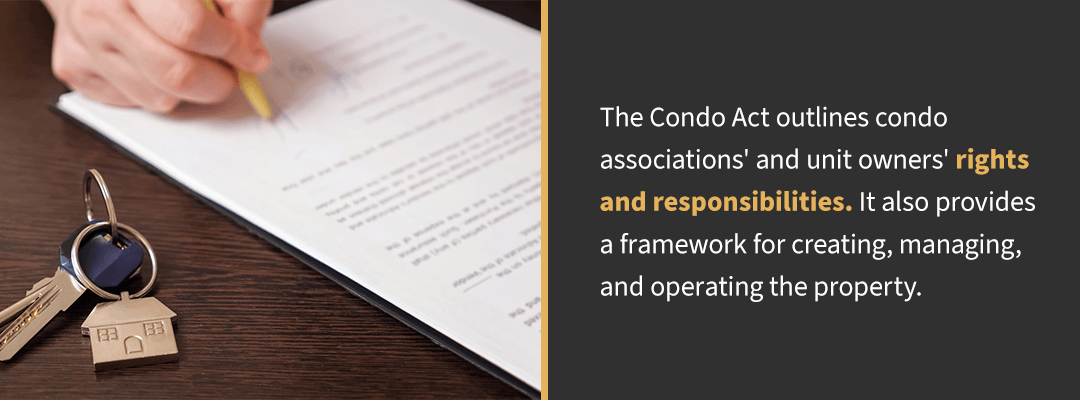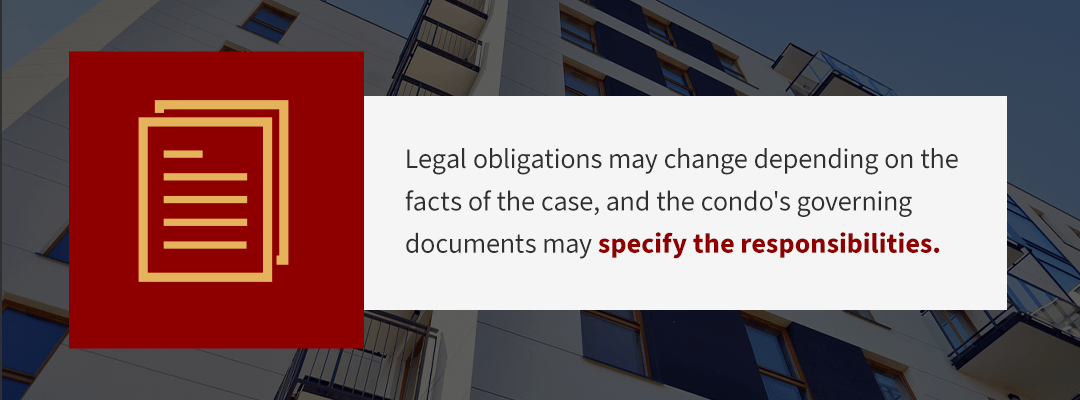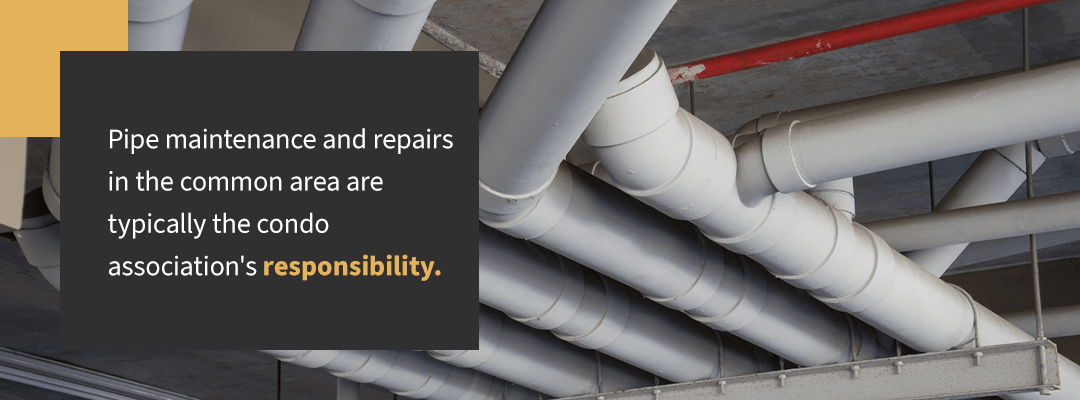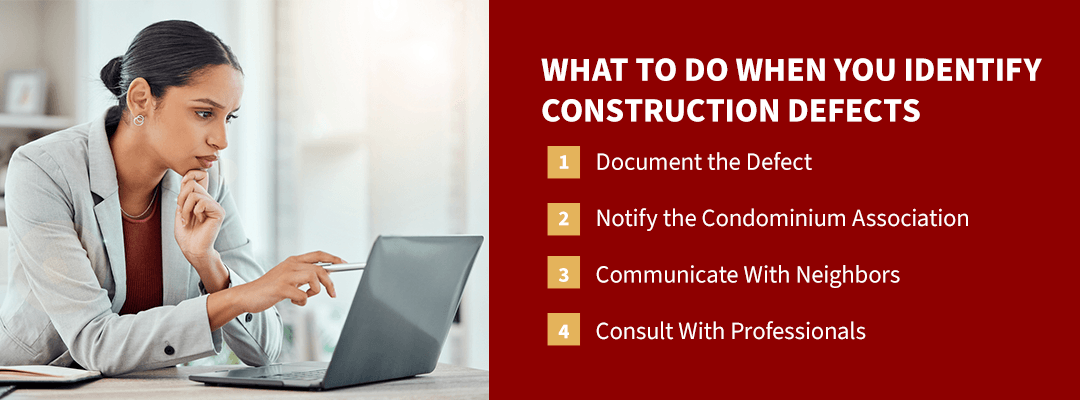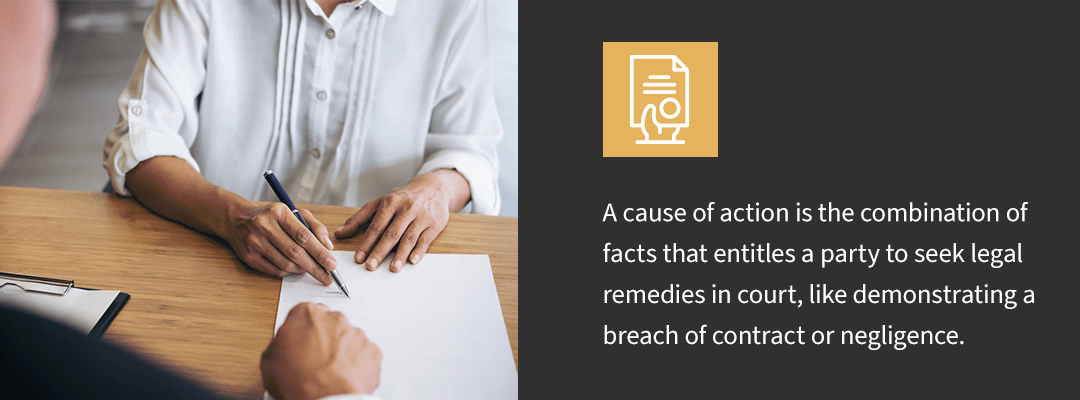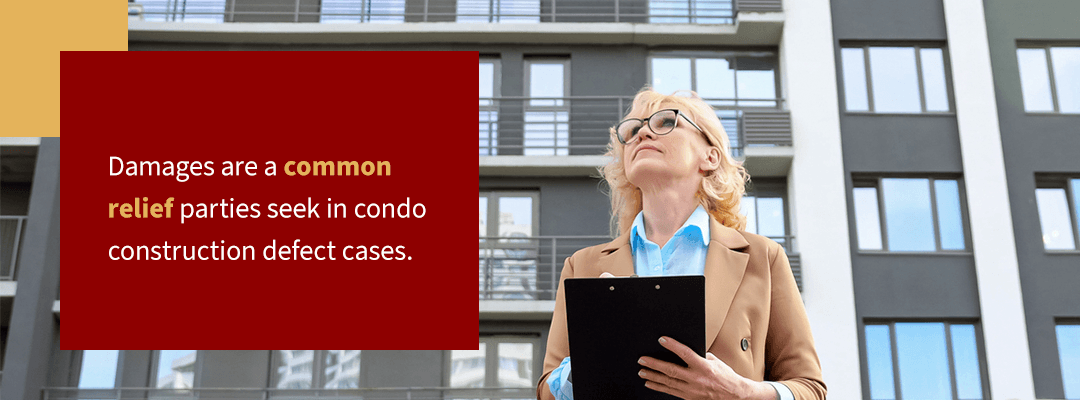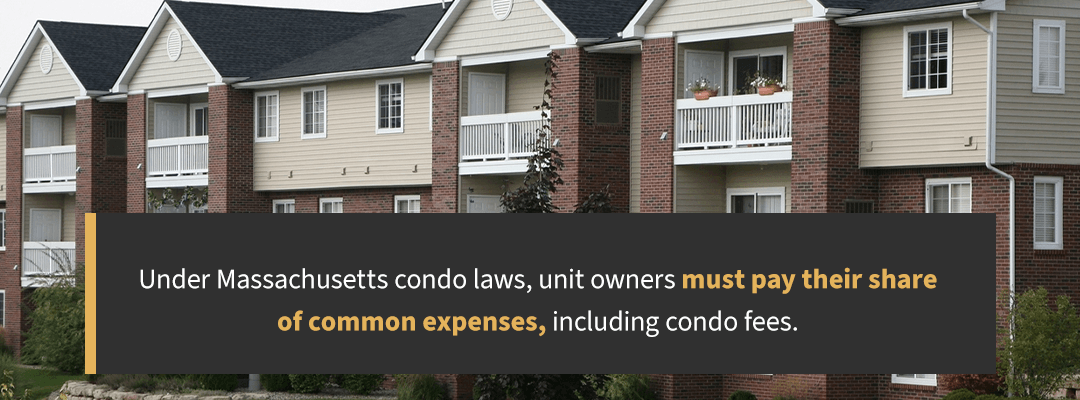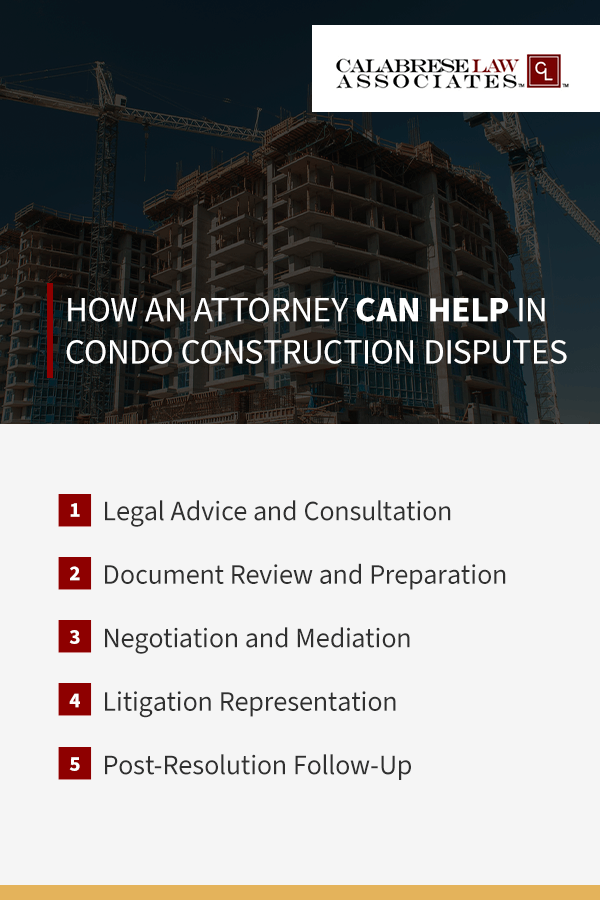Condominium disputes and construction defects can create significant challenges for unit owners and associations. From structural integrity and safety issues to disagreements over maintenance responsibilities and financial obligations, navigating these complexities requires a knowledgeable legal partner.
At Calabrese Law Associates, we help clients resolve condo disputes and address construction defects, ensuring their rights are protected. Our experienced team is dedicated to providing tailored legal solutions that facilitate effective communication and resolution among all parties. We will guide you through the intricacies of condominium law, helping you achieve a fair and satisfactory outcome.
Learn about Massachusetts condo laws, common construction issues, the responsibilities of parties, and the legal avenues for resolving disputes.
Contact Our Condo Attorneys Now
Condo Laws in Massachusetts
In Massachusetts, matters relating to condos fall under various laws and regulations. These include statutes, such as the Massachusetts Condominium Act (M.G.L. c. 183A), as well as general principles of property and contract law. The Condo Act outlines condo associations’ and unit owners’ rights and responsibilities. It also provides a framework for creating, managing, and operating the property.
General principles of property and contract law are developed from long practice and case law. Case law is the body of laws established following judicial decisions. These laws are multifaceted and complex, so working with the experienced attorneys at Calabrese Law Associates is crucial. We can examine your situation and determine which laws apply.
Overview of Condominium Disputes
Recent construction practices, including the need to build properties faster, and a short supply of skilled contractors have increased the likelihood of construction defects and claims. New construction products and varying installation methods are also contributing factors. Liability for construction defects exists in layers. These include:
- Unskilled labor: Construction workers must undergo proper training and supervision because the quality of their work can be questioned. They must follow manufacturers’ installation specifications and guidelines when using building products. Properly installed products can reduce issues like water leaks and limit liability.
- Complex designs: Most modern designs include complex details, such as corners, railings, and intersecting rooflines. These features leave them particularly susceptible to water intrusion, making maintenance challenging and expensive.
- Improper cost-cutting techniques: Contractors developing multiple projects usually seek opportunities to cut costs. This practice sometimes creates quality issues, causing the unit owners and condo associations to incur significant expenses in the long run.
- Poor maintenance: The unit owners must maintain their premises. If they use the property in a way that causes defects, affected parties, including the condo associations, can take appropriate legal action.
Considering the potential financial implications, it is necessary to assign liability and seek damages through construction defect claims.
What Are Common Condo Defects?
There are different construction defects, but some occur more than others. Here are six common examples:
1. Water Intrusion and Leaks
Poor roof installation or materials can lead to leaks, causing water damage to units below. Similarly, improperly sealed windows and doors can allow water to enter, leading to mold and structural damage. Lastly, inadequate drainage on balconies can cause water to pool and cause leaks.
2. Structural Defects
Cracks in the foundation can compromise the integrity of the building. Improper framing can result in sagging floors, misaligned walls, and overall structural integrity. Finally, failing to support load-bearing walls properly can cause structural problems.
3. Electrical Problems
Improperly installed or inadequate wiring can pose fire hazards and lead to electrical failures. Some contractors fail to plan electrical outlets, which can inconvenience residents. Others also install circuit breakers incapable of handling the electrical load, resulting in frequent tripping or electrical fires.
4. Plumbing Defects
Plumbing defects include leaky pipes, draining issues, and water heater problems. Poorly installed or corroded pipes can lead to leaks, water damage, and mold growth. Improperly graded drainage systems can cause backups and flooding in common areas and units. Improper installation of water heaters can cause inadequate hot water supply and safety hazards.
5. HVAC Issues
Poorly installed heating, ventilation, and air condition (HVAC) systems can lead to inefficient heating and cooling and potentially increase energy costs. Additionally, leaky or improperly sized ductwork can reduce airflow and lead to inconsistent temperatures.
6. Insulation Deficiencies
Insulation helps maintain temperatures within the building. Unfortunately, some contractors underperform in this department, causing drafts, increased energy efficiency, and discomfort for residents. Moreover, thin walls or inadequate soundproofing can result in noise complaints between units.
Construction Defects That Cause Water Leaks in Common Areas
Common areas are collectively owned by the unit owners and controlled or managed by the condominium association. These spaces serve various functions but are often susceptible to water damage:
- Pools and hot tubs: Swimming pools are appealing and standard in most condos. The more luxurious properties also have hot tubs to help residents relax. The challenge is that these facilities can cause water damage when improperly constructed.
- Workout facilities: Fitness centers define residential convenience and draw in new residents. However, workout facilities with plumbing and water sources for fountains, toilets, and showers can be susceptible to water damage.
- Roofs: Construction defects on roofs can make them vulnerable to water leaks, as they are exposed to elements like rain and snow.
It is essential to inspect these areas when investing in condos. Some defects are latent, but proper due diligence can mitigate potential risks. If you realize these problems later on, consult the attorneys at Calabrese Law Associates immediately for legal advice.
Who Is Responsible for Structural Issues in a Condo?
Determining responsibility for structural issues in condominiums can be complex, as it often involves multiple parties. Legal obligations may change depending on the facts of the case, and the condo’s governing documents may specify the responsibilities. However, the following rules generally apply:
1. Develop or Builder Responsibility
The developer or builder is generally responsible for structural issues arising from construction defects. This includes problems related to foundation, framing, roofing, and other structural components. In many cases, there is an implied warranty that the builders are liable for defects in materials and workmanship for a certain period. If structural defects are identified within this warranty period, unit owners may have the right to seek repairs or compensation from the builder.
The developer is also responsible for ensuring the construction complies with local building codes and regulations. If structural issues arise due to noncompliance, the builder may be held liable.
2. Condo Association Responsibility
The condominium association is typically responsible for maintaining and repairing common areas, such as roofs, exterior walls, and foundations that serve multiple units. Most of these associations maintain insurance, which may cover structural repairs. If structural issues affect common areas, the association may file insurance claims to cover repair costs. The association is also responsible for assessing the need for repairs and taking appropriate actions to address structural issues in common areas.
3. Unit Owner Responsibility
Unit owners are generally responsible for maintaining and repairing the interior structures of their units, including walls, ceilings, and flooring. However, if these issues are caused by defects in the original construction or problems in the common areas, the responsibility may shift back to the developer or the association.
If a unit owner makes modifications or renovations that lead to structural issues, they may be held responsible for those problems. This includes issues arising from improper installation of walls, fixtures, or systems that affect the structural integrity of the unit.
What Repairs Are Condo Owners Responsible For?
Generally, condo unit owners are responsible for repairs inside their condominium units, including:
- Drywall
- Flooring
- Plumbing
- Electrical systems
- Appliances like ovens, microwaves, washers, and dryers
Review the bylaws and contact an attorney, as the obligations vary in certain situations.
Who Is Responsible for Pipes in Condo Walls?
Pipe maintenance and repairs in the common area are typically the condo association’s responsibility. If a broken pipe in a common causes leaks within the units, the condo unit owner may seek compensation from the condo association. However, if the condo unit owner broke the pipe intentionally or negligently, they are generally responsible for the repairs or replacement.
Condo owners need to notify others and work together if they detect a pipe defect that could potentially affect them. Approaching the condo association as a group to address construction problems is generally an effective strategy for getting positive results.
What to Do When You Identify Construction Defects
It’s vital to act right away when yozu detect a construction defect. The following steps should guide you:
1. Document the Defect
Investigate and document the extent of the problem. A water leak or defective drywall finishing could indicate a larger issue. It may be necessary to call a plumber or a professional licensed contractor for an opinion. If the problem is severe, like an active water leak, act immediately to mitigate further damage.
2. Notify the Condominium Association
Promptly inform the condominium association of the defect. You can submit a written request or complaint through the association’s established channels. Ask the association to inspect the defect, as they may need to assess the situation and determine if it falls under their responsibility.
3. Communicate With Neighbors
If you suspect the defect may affect other units or common areas, communicate with your neighbors. They may have experienced similar issues, and a collective approach can effectively address them.
4. Consult With Professionals
If the defect is significant, consider hiring a licensed contractor or building inspector to evaluate the issue. They can provide expert opinions on the cause of the defect and potential repair solutions.
Consulting with the construction defect lawyers at Calabrese Law Associates is also crucial. We can help you understand your rights and how you should proceed, especially if the association is unresponsive. A single unit owner may bring a lawsuit against the contractor for a construction defect, or the unit owners affected may join forces in bringing a lawsuit. However, consider alternative dispute resolution (ADR) mechanisms, like mediation, before commencing legal action. Litigation can be expensive and time-consuming and is best as a last resort.
Who Must File the Lawsuit in Condominium Disputes?
Before filing a lawsuit, you must determine which party has the capacity or legal authority. That party could be the condo unit owner or association, depending on the circumstances:
1. Condo Unit Owner
The unit owner may file a lawsuit if the defect only affects them and is unrelated to the common areas or the overall structure. Suppose the defect is caused by another unit owner or a third party’s negligence, such as a contractor hired by the unit owner. In that case, the affected unit owner may have grounds to file a lawsuit against that third party.
Unit owners can file lawsuits against the developer, builder, or contractor for construction defects that affect their units if those defects fall outside the association’s responsibilities.
2. Condo Association
If the defect affects the common areas, the condo association is generally responsible for filing a lawsuit. If the defect affects multiple units or the entire community, the association can take legal action on behalf of the unit owners. The association may initiate legal proceedings if the issue involves violations of the condominium’s bylaws or rules, like disputes with a unit owner about property modifications.
The association has a fiduciary duty to act in the best interests of the unit owners and is responsible for maintaining common areas. Therefore, it is often in the best position to address significant issues through legal action.
Legal Claims in Condominium Disputes
To succeed in a condo or construction defect lawsuit, you must establish a valid cause of action. A cause of action is the combination of facts that entitles a party to seek legal remedies in court, like demonstrating a breach of contract or negligence. Each of these claims has unique requirements. Here is a breakdown:
1. Breach of Contract Litigation
A breach of contract arises when a party in a contract fails to perform their obligations. When the claim involving defective construction between the condo unit owner and contractor or developer is based on a breach of contract, the condo unit owner typically files the suit. The applicable principles generally include:
- When purchasing a condo unit, the owner does not give up certain rights to the condo association. Among them is the right to sue the contractor for failing to deliver what was promised.
- Breach of contract claims are considered individual actions that can only be brought by a unit owner and not a condo association. The law recognizes that contractors may make different representations to each unit owner. Therefore, the damages incurred would be unique to each unit owner.
- An individual unit owner has unique claims and damages under breach of contract, separate from the condo association’s. In one such case, a condo association released the contractor from liabilities regarding a roof, and an individual unit owner was then able to recover damages. The contractor’s settlement with the condo association was held as a separate transaction from the breach of contract between the unit owner and the contractor.
2. Negligence Claim Litigation
Negligence occurs when one party fails to use reasonable care, resulting in another party’s loss, damage, or injury. A negligence claim alleges another person or entity is responsible for injuries or damage sustained by the claimant. Four factors must be found in a negligence claim to be successful — duty of care, breach of duty of care, damage caused by the breach, and foreseeability of this damage.
Construction negligence claims could arise from:
- Poor or inaccurate construction plans
- Failure to obtain the necessary permits
- Use of unsuitable or damaged materials
- Failure to properly use equipment or secure the construction site
- Errors in original design plans known to the builder that lead to damages
- Finished product that does not adhere to construction standards and codes
In negligent construction claims, the condo association typically has the authority to file suit against a contractor or developer. The following principles generally apply:
- The condo association is responsible for common expenses among unit owners for the maintenance and repair of the property. This responsibility also extends to fairly distributing common proceeds among unit owners. These powers make the association well-suited to pursuing construction negligence claims and seeking damages for negligent construction on behalf of all owners.
- In negligent construction actions, the condo association acts on behalf of all owners. It would be impractical for the association to champion the unit owners’ interests if they filed individual construction negligence claims.
- The condo association has the sole power to file a lawsuit against a contractor regarding shared areas of the development. The unit owners relinquish their control over and responsibility for common areas to the association through ownership. The condo association maintains these areas on behalf of the owners and, therefore, retains the right to file a construction negligence claim against the contractor for construction defects regarding these areas. Any proceeds from a lawsuit would then be distributed equitably to the unit owners.
Furthermore, the condo association’s bylaws may stipulate a specific procedure for disputes with third parties. The association is required to follow the bylaws regarding giving notice, mediation, and arbitration. If the bylaws are not specific, the condo association can proceed according to Massachusetts law.
Contact Our Condo Attorneys Now
Reliefs in Condo Construction Defect Lawsuits
Depending on the situation, you may obtain several forms of relief in condo construction disputes. Here are some examples:
1. Damages
Damages refer to the monetary compensation the winning party recovers in a lawsuit. There are different types, including:
- Compensatory damages: These are intended to compensate you for your losses. They may cover the costs of repairing the defect, loss of property value due to the defect, and other related expenses.
- Punitive damages: These are intended to punish the contractor or developer, especially if they acted with gross negligence or willfully misconducted themselves.
Damages are a common relief parties seek in condo construction defect cases.
2. Specific Performance
You may seek a court order requiring the contractor or developer to perform specific actions, such as repairing the defects. This is more common when monetary damages may not adequately address the problem.
3. Injunction
You can seek an injunction to prevent the contractor or developer from continuing certain actions that could exacerbate the defects or cause further harm. For example, if a contractor’s ongoing work is causing additional damage, the court may issue an injunction to halt that work.
4. Rescission
If the defects are severe, you may seek rescission of the contract with the contractor or developer. This means the contract is voided, and the parties are returned to their positions before the contract, which can include returning any payments made.
5. Declaratory Relief
You may seek a declaratory judgment to clarify rights and obligations under the condominium’s governing documents or the construction contract. This order can help resolve disputes regarding responsibilities for repairs and maintenance in the context of ongoing litigation.
Note that parties may settle disputes out of court. This option is usually less expensive and faster compared to litigation. However, it requires mutual consent, which can be impractical in certain instances.
Can a Condo Owner Sue the Association?
Yes, condo owners can sue their condo associations for various reasons. Sometimes, condo unit owners find themselves in disputes with their association and require legal help. While the condo association is required to act in the best interests of the owners, sometimes, the association fails to do so and must be compelled to.
An example would be if the condo association fails to follow the bylaws regarding property maintenance. A defect in the roof might cause water damage to a single unit. Individual unit owners could suffer damages if the condo association tries to keep its fees down by not repairing the roof immediately.
The balance of power between a unit owner and the condo association usually lies with the association. However, a collective of unit owners can sway over the association. If it is possible to inform other unit owners that the condo association’s conduct is affecting their units, such communication can be the first step in reaching a resolution.
Unit owners have the right to file a lawsuit against their condo association when the condo association violates Massachusetts law. However, as with any legal dispute, negotiating a settlement is usually preferred before pursuing litigation.
Consulting with experienced condominium dispute attorneys at Calabrese Law Associates is vital to resolving these disputes. Knowing your legal rights as a unit owner when dealing with condo association problems and having a professional legal assessment of the situation can help bring the best outcome.
Must the Unit Owner Pay Condo Fees?
Under Massachusetts condo laws, unit owners must pay their share of common expenses, including condo fees. This obligation is typically outlined in the condominium’s governing documents, such as the declaration and bylaws. Failure to pay these fees may result in penalties, interest charges, and potential legal action by the condo association to collect the outstanding amounts, such as liens. A lien is a legal claim placed on a property to secure debt payment.
Late payments can also be grounds for a lien, and the condo association can increase the assessment by any expense incurred as a direct result of the unit owner’s delay in payment. The condo association can also assess fees for items affecting the collective operating costs, like considering metered conditions. Here are two scenarios:
- In a property where water and utilities are not metered separately for each unit, the cost of installing a water-saving toilet or low-flow shower head can be returned to each unit owner
- In a building where utilities are metered separately, the condo association can charge unit owners for their portion of the usage if it follows specific assessment procedures.
How Do Condo Associations Calculate Fees?
A unit owner must pay a portion of the common expenses the condo association assesses. The association can use a couple of formulas to determine the amount of money each unit owner owes. Sometimes, the costs are divided equally. Other times, they are apportioned based on the relative size of each unit. The method for determining the amount of this debt should be stipulated in the master deed to the property.
The Legal Process of a Condo Lien
The condo association has broad powers to assess fees to unit owners. Since a condo association’s fee can become a lien on the condo unit if the condo fees are not paid, withholding payments from the association is not a successful means of changing their position or course of action on any condo dispute issue.
Massachusetts law makes it easy for condo associations to place a lien on a condo unit and to perfect the lien through court action. So long as the condo association follows the proper procedure, the lien on the unit has priority over all others, including mortgages and nonmunicipal creditors. Here is what the process typically entails:
- The condo fee payment is past due, typically over 60 days.
- The condo association sends a notice of lien specifying the unit owner’s delinquency.
- The unit owner has the opportunity to pay the debt.
- If the debt remains unpaid after the notice period, the condo association sends a notice of intent to initiate a lien.
- The association may file a lien enforcement action with the court if the unit owner fails to respond to the notice or pay the arrears. The filed complaint is also recorded with the appropriate registry of deeds.
- The unit owner is served with a copy of the complaint filed in court. The unit owner must respond within a specified period, typically 20 days.
- If the unit owner fails to answer, the condo association may file a motion requesting a default judgment, along with the necessary affidavits and memorandum.
- If the unit owner files an answer, but the condo association believes there are no genuine issues of material fact or that it is entitled to judgment as a matter of law, it can file a motion for summary judgment.
- If the court refuses the application for summary judgment or the condo association does not file for summary judgment, the court will assess the facts and law and pronounce judgment.
In the case of a maintenance or repair dispute, some other means of resolution are required. While the condo association has broad powers to assess and collect fees, it also has a responsibility to maintain the property for the enjoyment of all owners. Condo bylaws stipulate a procedure for removing board members or challenging the association’s decisions.
If a lien notice is sent to the mortgage lender, the lender will likely pay the outstanding fees and add the amount to the mortgage principal. This helps protect the property’s value by ensuring the condo association has the funds necessary to continue maintenance. It also protects the lender’s interest by ensuring they are the first mortgage or creditor to be paid if the condo unit falls into foreclosure or is sold.
How a Condo Unit Lien Can Lead to Foreclosure
In Massachusetts, a condo association can initiate foreclosure proceedings on a lien if the unit owner neglects payment of dues. The process is governed by statute and specific provisions in the condominium’s conditions, covenants and restrictions (CC&Rs). Generally, the association must notify the unit owner of the intent to foreclose. This notice must comply with state law requirements regarding timing and content.
While Massachusetts is a nonjudicial foreclosure state, whether the condo association can foreclose following a nonjudicial process depends on state law and the CC&Rs. To judicially foreclose, the association must file a lawsuit against the unit owner and obtain judgment from the court granting permission to sell the condo to satisfy the lien. To nonjudicially foreclose, the association does not have to go through state court but follows specific procedures that state law and any CC&Rs require.
How an Attorney Can Help in Condo Construction Disputes
Navigating condo construction disputes can be challenging, but an experienced attorney can assist. Here are five reasons why you should partner with a condo construction and contracts lawyer:
1. Legal Advice and Consultation
An attorney can help you understand your rights and obligations under the governing documents and applicable state laws. They can also assess the merits of a potential claim related to construction defects, breaches of contract, or negligence to determine your likelihood of success in a legal action.
2. Document Review and Preparation
Attorneys can review construction contracts and other relevant documents to identify potential issues, obligations, and liabilities. Additionally, they can prepare necessary legal documents, including demand letters, complaints, and motions, ensuring that all filings comply with legal requirements and deadlines.
3. Negotiation and Mediation
An attorney can represent you in negotiations to settle without going to court. If the dispute requires mediation, an attorney can guide you, advocating for your interests while facilitating communication.
4. Litigation Representation
If negotiations fail, an attorney can file a lawsuit on your behalf. They can represent you during court proceedings, gather and present evidence, examine witnesses, and make legal arguments to support your case.
5. Post-Resolution Follow-Up
If you obtain a favorable judgment, an attorney can assist in enforcing the judgment and collecting damages awarded by the court. They can help ensure all parties comply with settlement terms, protecting your rights and interests.
Why Trust Us?
At Calabrese Law Associates, we understand that condo disputes and construction defects have significant implications. That is why we offer services to help clients navigate these situations. Our team is knowledgeable in real estate and construction law. We provide personalized legal solutions tailored to your unique situation.
Calabrese Law Associates is dedicated to protecting your rights and interests, whether you are a unit owner facing construction issues or a condo association managing disputes. With a proven track record of successful negotiations and litigation, we manage complex legal challenges with skill and integrity. Our commitment to clear communication ensures you are informed and empowered throughout the process.
Trust us to advocate for you and achieve the best possible outcomes. Regarding resolving condo disputes and construction defects, Calabrese Law Associates is your trusted partner for comprehensive legal support.
Learn More About Condo Disputes and Calabrese Law Associates
Do you have a potential condominium dispute in the Greater Boston Area or anywhere in Massachusetts? Contact Calabrese Law Associates today! Our experienced attorneys can answer your questions and assess your situation. We want to help protect your legal interest to the best extent possible under the law and develop a strategy to move forward!
This publication and its contents are not to be construed as legal advice nor a recommendation to you as to how to proceed. Please consult with a local licensed attorney directly before taking any action that could have legal consequences. This publication and its content do not create an attorney-client relationship and are being provided for general informational purposes only.
Attorney Advertising. Prior results do not guarantee a similar outcome.




